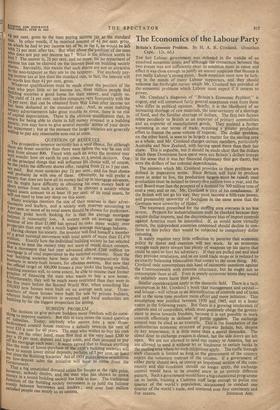The Economics of the Labour Party
THE last Labour government was defeated in the middle of an unsolved economic crisis, and although the connection between the two events was not sufficiently clear to establish them as cause and effect it was close enough to justify an uneasy suspicion that finance is not really Labour's strong point. Such suspicion must now be lurk- ing in the minds of many Labour supporters, and they should welcome the forthright survey which Mr. Crosland has provided of the economic problems which Labour must expect if it returns to power. Mr. Crosland's diagnosis, of "Britain's Economic Problem" is cogent, and will command fairly general acceptance even from those who differ in political opinion. Briefly, it is the likelihood of an increasing shortage of raw materials, the near-certainty of a shortage of food, and the familiar shortage of dollars. The first two factors relate peculiarly to British as an importer of primary commodities and an exporter of manufactured goods. They portend a further worsening in our terms of trade, requiring a greater productive effort to finance the same volume of imports. The dollar problem, on the other hand, is seen to be largely a matter for the sterling area as a whole, and Mr. Crosland charges certain members, particularly Australia and New Zealand, with having spent chore than their fair share. This is arguable, but it should be made clear that the dollars which these Dominions have spent were not Britain's dollars (except in the sense that it was her financial diplomacy that got them), but were the dollars of her colonial dependencies.
The answers which Mr. Crosland, provides to these problems are defined in imperative terms. Since Britain will have to produce more in order to live, the production targets must be raised; steel production must be hoisted to twenty-five million tons a year, and the coal Board must face the prospect of a demand for 300 million tons of coal a year, and so on. Mr. Crosland is sure of his conclusions. If the British will not go his way, they must become a fifth-rate power, and presumably unworthy of Socialism in the same sense that the Germans were unworthy of Hitler.
The treatment prescribed for the steffirig area overseas is no less severe. Projects for industrialisation mutt be checked because they require dollar imports, and the discriminatory bias of import controls against America must be intensified. If, as would seem virtually certain, the independent countries concerned should decline to con- form to this policy they would be subjected to compulsory dollar rationing. It surely requires very little reflection to perceive that economic policy by threat and coercion will not work. In an economic wrangle each party always has plenty of weapons up his sleeve that could be used to hurt his adversary. If they are pulled out and used they provoke retaliation, and so on until trade stops or is reduced to an exactly balancing bilateralism that comes to the same thing. Mr. Crosland only contemplates this kind of economic sanctions against the Commonwealth with extreme reluctance, but he ought not to contemplate them at all. Even in purely economic terms they would do infinitely more harm than good.
Similar considerations apply in the domestic field. There is a tacit assumption in Mr. Crosland's book that management and capital— and labour—will submit to an intensification of controls and of taxes and at the same time produce more effort and more initiative.- This assumption was justified between 1939 and 1945, and to a lesser extent in the following years. But there is a growing intolerance of controls and of controllers, which must positively oblige the govern- ment to move towards freedom, because it is not possible to work controls effectively in defiance of public opinion. The exchange control may be cited as an example. This is the foundation of the authoritarian economic structure of post-war Britain, but, despite, its key importance, it is little more than a moral dissuader. The direct door to exchange evasion is closed, but the side doors are left open. We are not allowed to send our money to America, but we are allowed to send it without let or hindrance to certain banks in the sterling area where no such inhibitions apply. The traffic through such channels is limited as long as the government of the country enjoys the voluntary support of the citizens. If a government of either party should seek to coerce an important section of the com- munity and this condition should no longer apply, the exchange control would have to be created anew in an entirely different pattern. Such a government would have a big educational programme on its hands, training a Customs staff large enough to police one quarter of the world's population, accustomed to conduct one quarter of the world's trade, and scattered over four continents and


















































 Previous page
Previous page